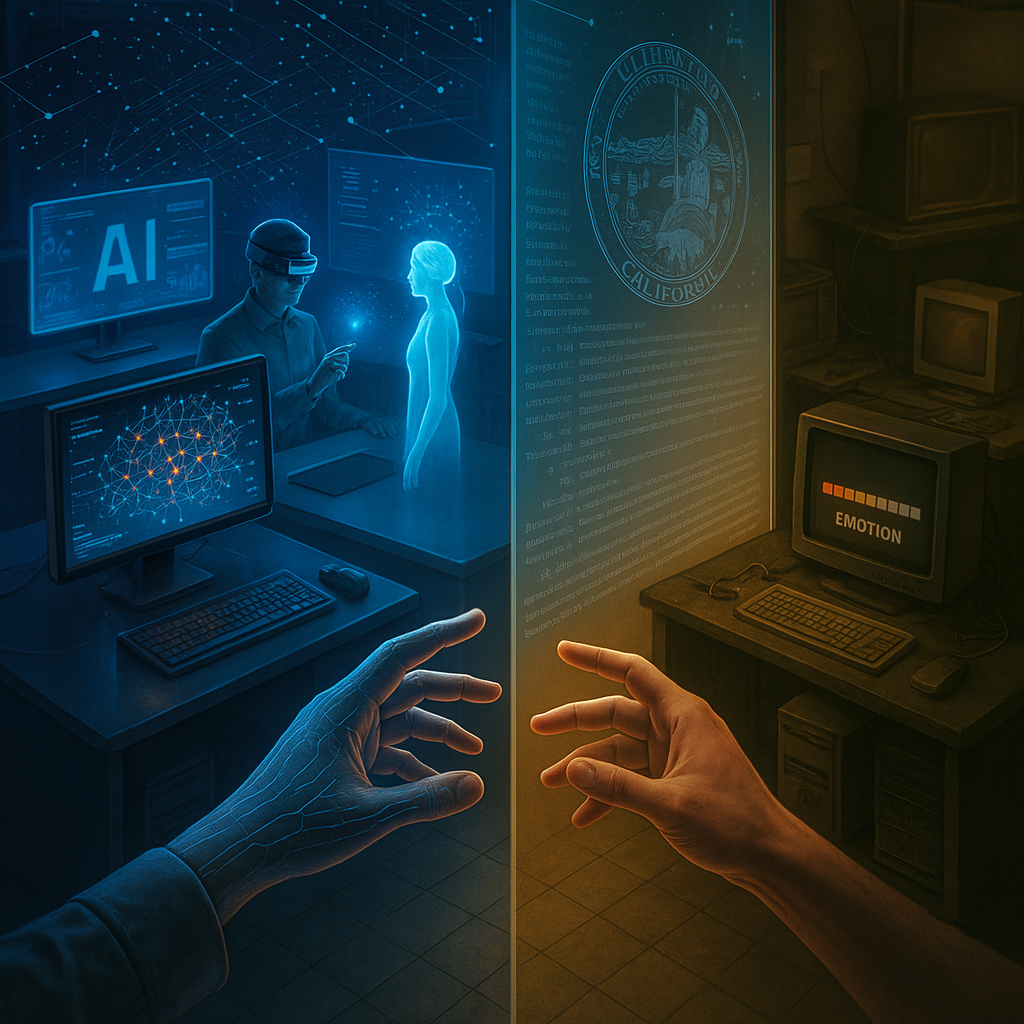Key Takeaways
- Most Americans expect AI to diminish empathy and moral reasoning by 2035.
- California advances a historic AI safety bill introducing robust whistleblower protections.
- The Federal Trade Commission initiates an investigation into AI companion chatbots marketed to children and teenagers.
- New data highlights significant economic divides in AI adoption and access between global regions.
- This AI press review underscores a widening gap between technological progress and societal adaptation.
Introduction
On 22 September 2025, the AI press review reveals that most Americans anticipate artificial intelligence will erode empathy and moral judgment by 2035. It’s an unsettling thought, really, and it certainly prompts concerns about the future shape of our values and relationships. As California pushes forward with landmark AI safety legislation and new whistleblower protections, today’s summary explores how rapid technological change affects both legal frameworks and the human condition.
Top Story
Americans Divided Over AI’s Impact on Social Bonds
A comprehensive national survey conducted by the Pew Research Center indicates that 68% of Americans believe artificial intelligence will significantly reduce human empathy and emotional connections within the next decade. The anxiety is even stronger among younger adults aged 18 to 29; 74% of them are worried about AI’s impact on authentic human relationships. Can technology ever truly replicate those real connections? A lot of people aren’t so sure.
While 82% of respondents recognize AI’s potential benefits in areas like healthcare and education, a solid 71% fear the technology may fundamentally alter how humans interact and form meaningful bonds. Dr. Sarah Chen, director of the MIT Media Lab’s Human-AI Integration Program, explained that these findings reflect a larger societal shift, suggesting people are increasingly viewing AI as a force that’s not just shaping commerce or industry, but human identity and social dynamics themselves.
One area where this is especially evident is in how AI shapes self-perception and digital identity. For more in-depth exploration, see generative identity and the profound influence of AI as a reflective surface for human consciousness.
Stay Sharp. Stay Ahead.
Join our Telegram Channel for exclusive content, real insights,
engage with us and other members and get access to
insider updates, early news and top insights.
 Join the Channel
Join the Channel
Also Today
AI Regulation
California Advances Landmark AI Rights Bill
The California State Legislature has passed a comprehensive AI rights bill requiring companies to disclose AI use in customer interactions, along with providing clear opt-out mechanisms. The legislation got bipartisan support and sets new standards for transparency and consumer protection.
Lawmakers stressed the urgency of creating guardrails around AI deployment. The bill’s sponsor, State Senator Marcus Rodriguez, put it simply, saying the framework aims to balance innovation with fundamental human rights.
California’s approach intersects with global developments in AI regulation. For a global perspective on these topics, explore the EU AI Act and the complexities of risk and compliance on a broader stage.
EU-US Collaboration on AI Safety Standards
Negotiators from the European Union and the United States have reached a preliminary agreement on shared AI safety standards. This could be a milestone for international AI governance, focusing on joint testing protocols and risk assessment measures for advanced AI systems. It’s not quite a done deal, but it definitely marks a shift toward global cooperation.
Global AI Divide
United Nations Report Warns of Widening AI Access Gap
The United Nations just released an analysis showing that 76% of AI research and development is still concentrated in only seven countries. The report highlights critical disparities in access to AI infrastructure between developed and developing nations.
These findings raise the alarm about growing technological inequality. UN Technology Envoy James Morton warned that if we don’t act soon, AI might just deepen existing global economic divides instead of bridging them.
As AI technology advances rapidly in certain regions, it is crucial to consider how computer vision and machine learning tools are transforming not only present economies but also the study of ancient societies. To understand how these innovations impact cultural knowledge and preservation, see AI archaeology and the intersection of technology and historical analysis.
What to Watch
- California Governor’s deadline to decide on the AI rights bill (30 September 2025)
- Federal Trade Commission public hearing on AI transparency requirements (5 October 2025)
- World Economic Forum special session on global AI access (12 October 2025)
Conclusion
Public concern over AI’s influence on empathy is running parallel with legislative action and heated international policy debates. Together, they signal a key moment for the themes raised in this AI press review. These developments highlight not only the urgency of regulation but also a deeper cultural divide as technology interweaves itself with our social values. What to watch next: the Governor’s decision on California’s AI rights bill, those upcoming FTC hearings on transparency, and the ongoing debate about global access at the World Economic Forum session. A lot could change—fast.
To dive deeper into the philosophical implications of AI’s impact on empathy, sentience, and consciousness, consider reading about digital suffering and the emerging questions about AI moral reasoning in our society.





Leave a Reply